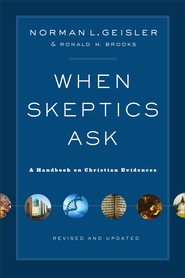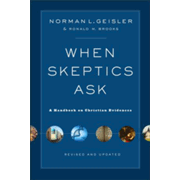Study of worldviews almost inevitably leads us into discussions with others about faith issues. This book addresses the common and not so common questions unbelievers raise to challenge our claims about the need for salvation through Jesus Christ. It begins with questions about God, His existence, and His nature. Examples of questions and challenges addressed: "If God created all things, then how did He create Himself?" and "God is nothing but a psychological crutch, a wish, a projection of what we hope is true." Following chapters deal with other gods, evil, miracles, Jesus Christ, the Bible, Bible difficulties, archaeology, science and evolution, the afterlife, truth, and morals.
Geisler and Brooks cover the major issues from a Protestant perspective, although they cannot possibly address every challenge within this one book. They steer us to other sources when necessary. For example, in the chapter on Bible difficulties they recommend Gleason Archer's Encyclopedia of Bible Difficulties (Zondervan Publishing House) for those who want to study further.
I find this book particularly useful because of its topical arrangement and the logical layout. It frequently follows the common progression of questions into which such discussions fall. This means that it will be more useful than an encyclopedic book where we have to jump around to follow a particular topic.
I also appreciate the fact that opposing arguments are treated with respect rather than ridicule, even while the authors are exposing their fallacies.
While many of Geisler's books are very challenging reading (lots of logic employed to present arguments), this one should be understandable to most high school students, especially if they read it in sections as they confront the various issues.
Note: I reviewed the 1990 edition, but this book has been updated twice since my original review.










